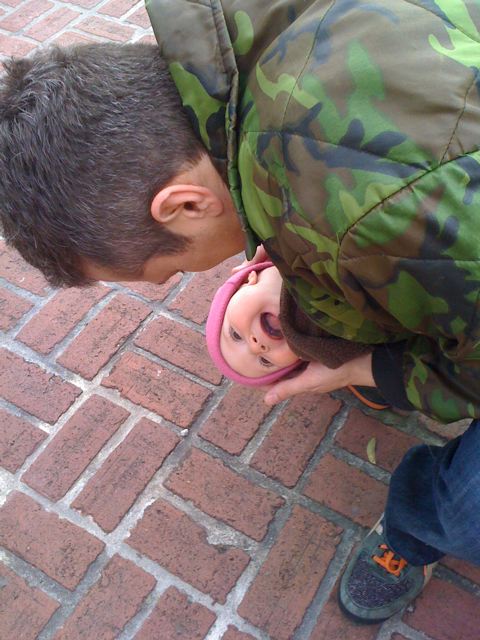 This week, in his MOMLOGIC column, the Gay Uncle muses on how those little (and big) bruises your child is always acquiring might make you look when you’re yelling at them in the grocery store, and wonders if you have ever been in a situation in which you’ve been thusly misinterpreted. Check it out.
This week, in his MOMLOGIC column, the Gay Uncle muses on how those little (and big) bruises your child is always acquiring might make you look when you’re yelling at them in the grocery store, and wonders if you have ever been in a situation in which you’ve been thusly misinterpreted. Check it out.
That’s Right, G
 The Gay Uncle’s sister Roxy is pregnant again, and she’s faced with a curious dilemma. Her husband’s father recently passed away and they want to give the child a name that will honor his memory. Though he was a senior officer in the military, they’ve ruled out Lieutenant, Captain, General and Jointchiefsofstaff. But given that the recently deceased grandfather’s name was George, they’re considering something related to this. The real issue is, the kid is going to be a girl. Hubby Nick is thus campaigning for Georgia, but Roxy feels torn about this name. (It’s a hick name, right?) “If we name her Georgia, people are going to make fun of her,” she said on the phone the other day. “People are going to make fun of her no matter what,” Gunc replied. “And by people, I mean, me.” The G.U. suggested they find another name in the G family. But in putting their heads together, the world’s #1 Guncle and his #1 sis failed to come up with a single viable soft g-sound option. Gina, Gena, Gene, Genesis, Genet, Giovanna, Gesine, Gianna, Gigi, Gypsy, Gyzzmo. They all suck.
The Gay Uncle’s sister Roxy is pregnant again, and she’s faced with a curious dilemma. Her husband’s father recently passed away and they want to give the child a name that will honor his memory. Though he was a senior officer in the military, they’ve ruled out Lieutenant, Captain, General and Jointchiefsofstaff. But given that the recently deceased grandfather’s name was George, they’re considering something related to this. The real issue is, the kid is going to be a girl. Hubby Nick is thus campaigning for Georgia, but Roxy feels torn about this name. (It’s a hick name, right?) “If we name her Georgia, people are going to make fun of her,” she said on the phone the other day. “People are going to make fun of her no matter what,” Gunc replied. “And by people, I mean, me.” The G.U. suggested they find another name in the G family. But in putting their heads together, the world’s #1 Guncle and his #1 sis failed to come up with a single viable soft g-sound option. Gina, Gena, Gene, Genesis, Genet, Giovanna, Gesine, Gianna, Gigi, Gypsy, Gyzzmo. They all suck.
So, he’s reaching out to you, his dear readers, to help out. Any suggestions?
That Rings a Bell
 The Gay Uncle plays his least favorite role–that of expert–once again in the Chicago Tribune, this time tackling the topic of keeping a five year old from peeing during the night. Or, more specifically, teaching a mother how not to encourage her five year old to pee during the night. Don’t worry, this keen bed wetting alarm (pictured to the left) is NOT involved.
The Gay Uncle plays his least favorite role–that of expert–once again in the Chicago Tribune, this time tackling the topic of keeping a five year old from peeing during the night. Or, more specifically, teaching a mother how not to encourage her five year old to pee during the night. Don’t worry, this keen bed wetting alarm (pictured to the left) is NOT involved.
Name That Position
 Should this be the Stick Shift 2.0 icon? Looks a bit like a salad toss. (Or something…lesbian.) What’s it look like to you?
Should this be the Stick Shift 2.0 icon? Looks a bit like a salad toss. (Or something…lesbian.) What’s it look like to you?
[Photo Credit: The Car Lounge/Jalopnik]
It’s So Cold in the D
 The Gay Uncle, in his role as Stick Shift–Vanity Fair’s online car columnist–is heading to his hometown of Detroit on Friday to cover the North American International Auto Show. Expect the usual hard-hitting journalism, exclusive interviews, misheggas, and generally skewed perspective on the industry. But to prepare yourselves for all of this, first check out this amazing video, which explains just about everything you need to know about The D.
The Gay Uncle, in his role as Stick Shift–Vanity Fair’s online car columnist–is heading to his hometown of Detroit on Friday to cover the North American International Auto Show. Expect the usual hard-hitting journalism, exclusive interviews, misheggas, and generally skewed perspective on the industry. But to prepare yourselves for all of this, first check out this amazing video, which explains just about everything you need to know about The D.
Plane and Simple
 This week, in his Momlogic column, the Gay Uncle covers off on what NOT to take on the plane to entertain your young kids.
This week, in his Momlogic column, the Gay Uncle covers off on what NOT to take on the plane to entertain your young kids.
Raising the Bar
 Here’s a little secret the city of New Orleans has cracked that the Gay Uncle believes may be of use to parents everywhere. It comes from a machine. It is served in a cup. And in the Crescent City, it is readily available at places where moms and dads congregate with their kids: parks, zoos, tourist attractions, and movie theaters showing endless screenings of The Princess and the Frog. It’s called a Daiquiri and it comes in as many flavors as Benjamin Moore paint. (Meaning, it’s rainbowly endowed, but always tastes just about the same.) When visiting the Audubon Animal Wildlife Refuge the other day with his parent friends John and Mary and their baby girl Victor, Gunc and his BF were thrilled to note that a) it was after noon, b) the concession stand was located next to the entrance (because what is a visit to any public space like this besides an excuse to eat junk food) and c) that the second item on the “menu” after hot dog was booze. Thinking it would simply take the edge off, we all ordered a bright red cup of Adult Juice Slushie. Little did we know that, hidden beneath the electric berry hue/taste was some sort of potent moonshine. The G.U. is uncertain if it was brain freeze or grain (as in grain alcohol) freeze that caused his boyfriend to shout, “I can’t see!” after his first chuggle, but he is sure that about a third of the way through the tiny cup, all four adults no longer cared that the elephants were in an enclosure about the size of a Manhattan one bedroom, that the giraffes were fighting, that there was a rusty old bathtub and junked car floating in the “Cajun Country Swamp” exhibit, or that some genius had had the bright idea of locating the pens for the Wild African Dogs and the Antelopes right next to each other separated only by a chain link fence (causing nonstop neurotic border pacing on the part of the canines). As is evident in the photo above, little Victor enjoyed the zoo, regardless.
Here’s a little secret the city of New Orleans has cracked that the Gay Uncle believes may be of use to parents everywhere. It comes from a machine. It is served in a cup. And in the Crescent City, it is readily available at places where moms and dads congregate with their kids: parks, zoos, tourist attractions, and movie theaters showing endless screenings of The Princess and the Frog. It’s called a Daiquiri and it comes in as many flavors as Benjamin Moore paint. (Meaning, it’s rainbowly endowed, but always tastes just about the same.) When visiting the Audubon Animal Wildlife Refuge the other day with his parent friends John and Mary and their baby girl Victor, Gunc and his BF were thrilled to note that a) it was after noon, b) the concession stand was located next to the entrance (because what is a visit to any public space like this besides an excuse to eat junk food) and c) that the second item on the “menu” after hot dog was booze. Thinking it would simply take the edge off, we all ordered a bright red cup of Adult Juice Slushie. Little did we know that, hidden beneath the electric berry hue/taste was some sort of potent moonshine. The G.U. is uncertain if it was brain freeze or grain (as in grain alcohol) freeze that caused his boyfriend to shout, “I can’t see!” after his first chuggle, but he is sure that about a third of the way through the tiny cup, all four adults no longer cared that the elephants were in an enclosure about the size of a Manhattan one bedroom, that the giraffes were fighting, that there was a rusty old bathtub and junked car floating in the “Cajun Country Swamp” exhibit, or that some genius had had the bright idea of locating the pens for the Wild African Dogs and the Antelopes right next to each other separated only by a chain link fence (causing nonstop neurotic border pacing on the part of the canines). As is evident in the photo above, little Victor enjoyed the zoo, regardless.
Oscar Contenders: Gay Porn Variants
 In his role as Vanity Fair’s online Fun&Faggy Editor, The Gay Uncle re-imagines the leading Oscar contenders as high-concept gay porno flicks. (And he would like to thank the Academy for this opportunity.)
In his role as Vanity Fair’s online Fun&Faggy Editor, The Gay Uncle re-imagines the leading Oscar contenders as high-concept gay porno flicks. (And he would like to thank the Academy for this opportunity.)
Top 5 Cars of the Year
 As Stick Shift (Vanity Fair’s Gay Car Blog) I got to insert myself into a juicy shitload of gorgeous metal this year. In this piece, I list my top five faves.
As Stick Shift (Vanity Fair’s Gay Car Blog) I got to insert myself into a juicy shitload of gorgeous metal this year. In this piece, I list my top five faves.
A Holiday Proposal
 It’s Christmas Eve Day, not actually an official holiday for many people, and definitely not one for those of us who don’t believe that little Jewish kid from Bethlehem was the messiah. But you know that the Gay Uncle always sides with the women (and particularly the mothers), so he’d like to note something important about the date. If we accept that the Little Baby Jesus (LBJ) was born on December 25, then it’s proper to assume that his virginally pregnant ema (that’s mom, in Hebrew) spent at least some portion of December 24 in massive contraction-based pain. (Unless magic pregnancy by God results in an agony-free birth.)
It’s Christmas Eve Day, not actually an official holiday for many people, and definitely not one for those of us who don’t believe that little Jewish kid from Bethlehem was the messiah. But you know that the Gay Uncle always sides with the women (and particularly the mothers), so he’d like to note something important about the date. If we accept that the Little Baby Jesus (LBJ) was born on December 25, then it’s proper to assume that his virginally pregnant ema (that’s mom, in Hebrew) spent at least some portion of December 24 in massive contraction-based pain. (Unless magic pregnancy by God results in an agony-free birth.)
So in honor of mommies everywhere, Gunc would therefore like to propose a little festive nomenclatural switcheroo. Since 98% of people already confuse the name of the celebratory long weekends that bookend the summer–the ones that land at the end of May and the start of September–the G.U. suggests that these both henceforth be referred to as Memorial Day. This would not only lessen the tedious problem of recalling which is which and be a more honest reflection of our true feelings on these dates (we’re Memorializing the start and end of summer, period), it would free up the title LABOR DAY for utilization on the day before X-mas, where it really belongs. Being a Union member (UAW Local 7902), the Gay Uncle wouldn’t want to lose this synonymical meaning for the word, so he’d leave it be–Workers and Mothers of the World, Unite! But the connection to childbirth would help draw attention to the unpaid work many women do inside the home. Think about that as you wrap your presents and chug your eggnog and otherwise steel yourself against the emotional torment of spending time with your family. (This precursor to the pain and disappointment that always accompanies Christmas Day could also be seen as a form of labor.) And enjoy your holiday.